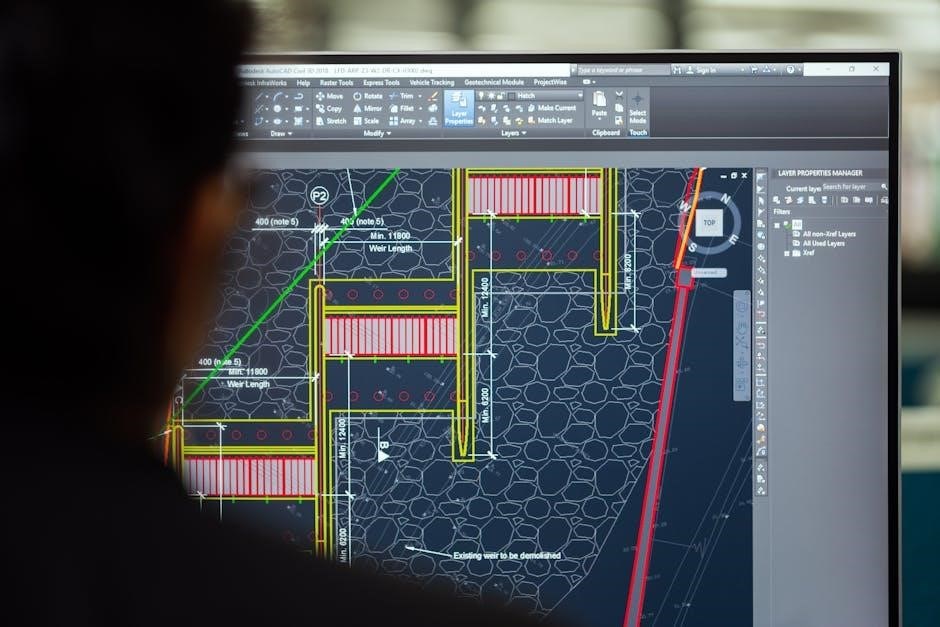
ian sommerville software engineering 10th edition pdf
Ian Sommerville’s Software Engineering 10th Edition provides a comprehensive overview of modern software development practices‚ updated with new chapters on systems engineering and resilience engineering.
Overview of Software Engineering
Software engineering is a systematic approach to developing‚ maintaining‚ and designing software systems. It encompasses a broad range of activities‚ including requirements gathering‚ design‚ implementation‚ testing‚ and evolution. The field emphasizes the application of engineering principles to ensure software quality‚ reliability‚ and efficiency. Modern software engineering incorporates methodologies like Agile development and DevOps‚ focusing on iterative processes and collaboration. Ian Sommerville’s 10th Edition highlights the integration of systems engineering‚ resilience engineering‚ and contemporary practices to address complex challenges in software development. The book serves as a foundational resource‚ blending theoretical concepts with practical applications to equip students and professionals with essential skills in creating robust software systems.
Importance of the 10th Edition by Ian Sommerville
The 10th Edition of Ian Sommerville’s Software Engineering is a landmark update‚ offering insights into contemporary software development practices. It bridges the gap between theory and practice‚ making it invaluable for both students and professionals. The book’s updated content reflects the evolving nature of the field‚ with new chapters on systems engineering and resilience engineering. These additions address critical challenges in developing large-scale‚ complex systems. The edition also emphasizes Agile methodologies‚ providing practical guidance for real-world applications. By incorporating modern engineering practices‚ Sommerville’s work remains a cornerstone in software engineering education and professional development‚ ensuring readers are well-equipped to tackle current and future challenges in the industry.

Structure of the 10th Edition
The 10th Edition is organized into four parts‚ covering methods‚ tools‚ and techniques for software development. It includes new chapters on systems engineering and resilience engineering.

Organization of the Book
The 10th Edition is structured into four parts‚ each focusing on key aspects of software engineering. Part 1 introduces foundational concepts‚ including software processes and requirements engineering. Part 2 delves into software design‚ covering architecture‚ patterns‚ and user experience. Part 3 explores software development practices‚ emphasizing agile methodologies and DevOps. Part 4 addresses system dependability‚ with chapters on security‚ reliability‚ and resilience engineering. This logical flow ensures readers build a comprehensive understanding of the discipline. The organization supports both introductory and advanced courses‚ making it adaptable for various learning needs. Each chapter includes real-world examples and case studies to reinforce theoretical concepts with practical insights.
New Chapters and Updates
The 10th Edition introduces new chapters focusing on systems engineering and resilience engineering‚ addressing the growing complexity of modern software systems. These additions provide insights into managing large-scale systems and ensuring system reliability. Updates include expanded coverage of agile methodologies and DevOps practices‚ reflecting current industry trends. The book also incorporates modern engineering practices‚ offering practical guidance on applying these techniques in real-world scenarios. These updates ensure the content remains relevant and aligned with contemporary software development challenges. The enhanced focus on systems engineering and resilience engineering equips readers with skills to handle complex‚ interconnected systems effectively. Overall‚ the updates enrich the learning experience‚ making the book a valuable resource for both students and professionals.

Key Areas Covered in the Book
The book covers software processes‚ agile development‚ systems engineering‚ resilience engineering‚ software requirements‚ architecture‚ and practical applications‚ providing a comprehensive understanding of modern software engineering.
Software Processes and Agile Development
The 10th edition of Ian Sommerville’s Software Engineering delves into software processes and agile development‚ emphasizing their critical role in modern software engineering. It explores various software development methodologies‚ including iterative and incremental approaches‚ highlighting how these frameworks enhance collaboration and adaptability. Agile development is thoroughly discussed‚ with a focus on its principles‚ such as continuous delivery‚ refactoring‚ and test-driven development. The book also examines the integration of agile practices with traditional software processes‚ providing practical insights into managing complex projects. By covering real-world applications and case studies‚ Sommerville illustrates how these methodologies improve software quality and responsiveness to changing requirements. This section serves as a valuable resource for understanding the evolution and implementation of software processes and agile practices in contemporary engineering environments.
Systems Engineering and Resilience Engineering
The 10th edition of Ian Sommerville’s Software Engineering extensively covers systems engineering and resilience engineering‚ introducing readers to the principles and practices of developing dependable and secure software systems. The book includes new chapters dedicated to these topics‚ emphasizing the importance of systems engineering in managing complexity and ensuring system reliability. It explores key areas such as dependability‚ security‚ and fault tolerance‚ providing practical insights into designing resilient systems. The text also discusses the integration of systems engineering with software engineering‚ highlighting how these disciplines work together to address real-world challenges. By focusing on modern approaches and case studies‚ Sommerville equips readers with the knowledge to build robust and adaptable systems‚ essential for meeting the demands of today’s complex software environments;
Software Requirements and Architecture
Ian Sommerville’s 10th Edition delves into the fundamentals of software requirements and architecture‚ providing a detailed exploration of how to define‚ analyze‚ and manage requirements effectively. The book emphasizes the importance of requirements engineering in ensuring that software systems meet stakeholder needs and expectations. It also covers architectural design‚ focusing on patterns‚ styles‚ and frameworks that enable the construction of scalable‚ maintainable‚ and adaptable systems. Practical examples and case studies illustrate the application of these concepts‚ helping readers understand how to translate requirements into a cohesive architecture. The text further discusses modern approaches‚ such as Agile methodologies and DevOps practices‚ highlighting their impact on requirements gathering and architectural decision-making. This section is essential for both students and professionals seeking to master the art of building robust software systems.

Target Audience
The 10th edition of Ian Sommerville’s Software Engineering is designed for university students‚ professionals‚ and anyone seeking to master modern software development principles and practices.
University and College Students
The 10th edition of Ian Sommerville’s Software Engineering is tailored for undergraduate and graduate students pursuing degrees in computer science‚ software engineering‚ and related fields. The book provides a structured approach to learning software engineering fundamentals‚ with clear explanations of key concepts‚ practical examples‚ and real-world case studies. It supports introductory and advanced courses‚ offering a balanced blend of theory and practice. The text is organized into four parts‚ covering software processes‚ systems engineering‚ requirements‚ and architecture‚ making it an ideal resource for students needing a comprehensive understanding of software development. Additionally‚ the inclusion of new chapters on systems and resilience engineering prepares students for emerging trends in the field.
Professionals in Software Development
The 10th edition of Ian Sommerville’s Software Engineering is an invaluable resource for professionals in software development‚ offering insights into modern engineering practices and updated methodologies. It provides practical guidance on agile development‚ systems engineering‚ and resilience engineering‚ essential for adapting to industry trends. The book serves as a comprehensive reference‚ enabling professionals to enhance their skills in software processes‚ requirements engineering‚ and architecture. With real-world case studies and examples‚ it bridges the gap between theory and practice‚ making it ideal for practitioners seeking to stay current with evolving technologies and methodologies. This edition is particularly useful for those involved in complex software projects‚ ensuring they are well-equipped to tackle contemporary challenges in the field.

Updates in the 10th Edition
The 10th edition introduces new chapters on systems engineering and resilience engineering‚ offering updated insights into modern software development practices and methodologies.

Incorporation of Modern Engineering Practices
The 10th edition of Ian Sommerville’s Software Engineering integrates contemporary engineering practices‚ emphasizing agile methodologies and systems engineering. It provides practical insights into resilient system design‚ ensuring adaptability to evolving technologies. These updates reflect current industry standards‚ offering students and professionals a robust framework for developing reliable software systems. The inclusion of real-world case studies further enhances the practical application of these modern practices‚ making the book a valuable resource for both academic and professional settings. This edition effectively bridges theory and practice‚ ensuring that readers are well-prepared to tackle the challenges of software development in a dynamic and competitive environment.
Expanded Coverage of Systems Engineering
The 10th edition of Ian Sommerville’s Software Engineering significantly expands its focus on systems engineering‚ offering in-depth discussions on system design‚ integration‚ and resilience. New chapters dedicated to systems engineering provide a holistic view‚ emphasizing the importance of systems thinking in software development. The book explores the interplay between software and systems engineering‚ highlighting how systems engineering principles can enhance software system reliability and scalability. This expanded coverage is particularly beneficial for students and professionals seeking to understand the broader context of software systems within complex environments. The inclusion of practical examples and case studies further enriches the learning experience‚ making this edition a comprehensive resource for both academic and professional use.
Practical Applications
The 10th edition includes real-world case studies and examples‚ offering practical insights into software development. It provides guidance on agile methodologies‚ enhancing hands-on learning experiences for students and professionals.
Case Studies and Real-World Examples
The 10th edition of Ian Sommerville’s Software Engineering incorporates numerous case studies and real-world examples‚ providing students with practical insights into software development challenges. These examples highlight successful implementations of modern engineering practices‚ such as agile methodologies and resilience engineering. By examining real-world scenarios‚ readers gain a deeper understanding of how theoretical concepts are applied in industry settings. The case studies cover a wide range of topics‚ including software requirements‚ architecture‚ and systems engineering‚ making the content relatable and applicable to future careers in software development. This approach ensures that learners can bridge the gap between academic knowledge and professional practice effectively.
Guidance on Agile Methodologies
The 10th edition of Ian Sommerville’s Software Engineering provides detailed guidance on agile methodologies‚ emphasizing their importance in modern software development. The book introduces students to core agile principles‚ such as iterative development‚ continuous improvement‚ and customer collaboration. It explores practical techniques like Scrum‚ Kanban‚ and test-driven development‚ offering insights into how these methods enhance project flexibility and delivery. The text also discusses the integration of agile practices with systems engineering‚ highlighting their relevance in complex software systems. By focusing on real-world applications‚ the book equips readers with the knowledge to implement agile methodologies effectively in various project scenarios‚ making it a valuable resource for both students and professionals aiming to master contemporary software development approaches.

Accessing the 10th Edition
The 10th edition of Ian Sommerville’s Software Engineering is available as a PDF‚ accessible via Pearson’s official website‚ online retailers‚ and academic platforms for easy download.
Availability of the PDF Version
The PDF version of Ian Sommerville’s Software Engineering 10th Edition is widely accessible through various platforms. It can be purchased directly from Pearson’s official website‚ ensuring authenticity and quality. Additionally‚ popular online retailers like Amazon and eBay offer the eBook for immediate download. Academic platforms such as O’Reilly and library services also provide access‚ often with a free trial period for new users. Students and professionals can conveniently acquire the PDF version‚ making it easier to study or reference the material on digital devices. This accessibility ensures that learners worldwide can benefit from the comprehensive insights and updated content of the 10th edition.
Resources for Further Learning
To complement the 10th edition of Ian Sommerville’s Software Engineering‚ various online resources are available for deeper exploration. Pearson offers accompanying study materials‚ including lecture slides and practice exercises. O’Reilly’s platform provides access to related books‚ live events‚ and courses tailored to software engineering. Additionally‚ the book’s publisher has curated a list of recommended readings and tools for practical application. Online communities and forums dedicated to software engineering also serve as valuable spaces for discussion and knowledge sharing. These resources empower learners to expand their understanding beyond the textbook‚ fostering continuous skill development in the ever-evolving field of software engineering.